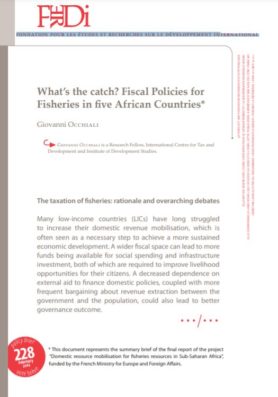Policy Brief 228
The taxation of fisheries: rationale and overarching debates.
Many low-income countries (LICs) have long struggled to increase their domestic revenue mobilisation, which is often seen as a necessary step to achieve a more sustained economic development.
A wider fiscal space can lead to more funds being available for social spending and infrastructure investment, both of which are required to improve livelihood opportunities for their citizens.
A decreased dependence on external aid to finance domestic policies, coupled with more frequent bargaining about revenue extraction between the government and the population, could also lead to better governance outcome.
